Friends in Christ,[i] today is a Saturday of our Lady, and this dear Blessed Virgin can easily come to mind as we read the gospel today. 3 times Our Lord says, ‘Don’t worry.’ ‘“Therefore I tell you, do not worry about your life.’ Later he says, ‘So do not worry and say, ‘What are we to eat?’ And then again: ‘Do not worry about tomorrow; tomorrow will take care of itself.
.
People often worry because they are afraid that God won’t arrange things to be the way they want them to be; they worry that something difficult, painful, or unwanted might come. But we know that we must put ourself in the hands of God, and accept his will whether it be easy or difficult.
.
But it can also help us to realize that we have a Mother above, who is very solicitous for us, Mary wants to help us, just like a good mother does. I was speaking to a mother recently, asking her about her adult children. She told me about them. I said, ‘did you not also say you had a son in California?’ ‘Yes, she said. He is the one that causes all my worries.
.
Our Mother Mary is not filled with worries, but with a real concern and a readiness to help us. Now you may say, ‘perhaps Mary does not see, or does not feel for our necessities? Oh, she does. St. Antoninus says, there is not one among all the saints who can ever feel for us in our troubles, both bodily and spiritual, like this woman, the most Blessed Virgin, so much so, he says, that when she sees our suffering heart, she cannot do otherwise than instantly fly to relieve it with her compassion.
.
The Emperor Titus so much wanted to show assistance and mercy to those who came to him, that when a day passed without being able to grant a favor, he used to say, ‘I have lost a day, for I have spent it without benefiting anyone.’ But Mary is greater than a pagan emperor; her heart would be all sorrow, if a day should pass when she cannot obtain some favor for us to help us. Bernadine de Bustis therefore says, whenever we go to Her, we always find her hands full of mercy and generosity.
.
[i] Glories of Mary, p. 251-2
Friends in the Lord, many actions that we do are moral acts; some are not moral acts, such as blinking our eyes, the beating of our heart, blood clotting – but many actions we do are moral acts, that is, there is a right or wrong in them, or a ‘best or better.’
.
Deciding to sit down to watch tv is a moral act. Visiting a friend, getting up at a certain time are moral acts. The morality, or the rightness of an action depend not only on the action itself and the circumstances, but also on our intention. If we sit down to watch a perfectly good tv show, but we are doing it with the intention of avoiding helping our mother who isn’t feeling well – our bad intention turns this into a sinful action.
.
If we give money to a poor man on the street, that would be a good thing – unless our intention was bad, such as doing it so that our friend will be impressed with our generosity. It is easy for our intentions to not be pure in so many events of our daily life. Our motives are often mixed.
.
We do or say things for our selfish advantage or to subtly undermine another, or so that we look good. Today, our Lord says, ‘The lamp of the body is the eye. If your eye is sound, your whole body will be filled with light; but if your eye is bad, your whole body will be in darkness.’
.
The ‘eye’ is the intention that we have when we do something, and the ‘body’ is the action that follows our intention. In the same way that the body follows the eyes, our works follow our intentions. Our Lord says that it is the intention which gives light to our works. And so without a good intention, there cannot be any good work. Our intention has to be pure and right, in order to do a good work, otherwise, the whole work is darkness, that is, sinful.
.
The most pure and right intention we can have is to do everything for love of God. St. Josemaria says, you’ll always have purity of intention if you seek in all things to please only God. (Way, 287)
11th Week in Ordinary Time
Beloved in Jesus Christ, in the 4th century, there was a young girl named Mary, who ran away from home; she went to Egypt, we know not why; there she lived a scandalous life of harlotry for 16 years.
.
Always ready for the next adventure, she teased sailors to take her aboard a ship headed for Jerusalem. Now at that time, Jerusalem was celebrating the Feast of the Holy Cross, and as thousands were going into the Church, curiosity made her desire to enter. At the door however, she felt herself repelled by an invisible force. Again and again, she could not enter.
.
She began to weep, seeing that it was on account of her wicked life that God had repelled her from the church. In that moment she raised her eyes to see a picture of Mary. In her tears she exclaimed, ‘O Mother of God, pity here a poor sinner! You are the refuge of sinners.’ She seemed to hear the Blessed Virgin say: My child, go – enter the church.’
.
She was able to enter, and there adored the Relic of the Holy Cross with the others. In gratitude for God’s mercy, she retired to a life of prayer across the Jordan river where she lived as a hermit in the desert for 57 years.
.
The famous monk, Zosimus one day met her; he gave her holy Communion, and returned a year later, but she had died. Her body was surrounded by a brilliant light, and written in the sand were the words: Bury my body here, it is that of a poor sinner. A lion came and made a grave with his claws. Zosimus then hurried back to relate to all the wonderful story of St. Mary of Egypt; a sinner who found God’s mercy.
.
Friends in Christ, the story of our faith is the story of countless sinners who experienced God’s mercy, and returned to him. In the gospel today, we see another example of this; this woman who had also led a scandalous life, but, wishing to change her ways, she finds that Jesus is offering a new beginning for persons such as herself. She humbles herself before the Lord, and in this, she is different from the others who are there.
.
In fact, when the Pharisee questions the woman’s actions, Jesus points out that mercy is shown to those who humble themselves, who give their heart in love of God, not the self-righteous.
.
This year, the Church has placed great emphasis on mercy; in fact, it is designated the Year of Mercy. What is this mercy of God? Well, God is pure love – he is infinite, pure love. Love is God’s essential attribute. Bishop Robert Barron says, ‘mercy, is what God’s love looks like, when it turns toward the sinner.’
.
It is common today for people to say ‘God is merciful,’ and sometimes they think that God doesn’t mind if we commit sins, that God doesn’t really mind if I live this way, contrary to his law. But this is completely wrong. St. Mary of Egypt only experienced God’s mercy once she had seen the horror of her sinful life, and how it blocked her from God. The woman who washed Jesus’ feet in tears – she only experienced God’s mercy because she recognized her evil life and wished to turn from it.
.
People who go through life rationalizing that they are so good never really experience God’s mercy; only the person who knows how serious is their illness, can rejoice when the doctor says, ‘you are cured.’ If you want to meet a happy person, it is the one who knows his sins, and is grateful for God’s mercy.
.
Something that modern man badly needs, is Mercy. The gospel of Jesus Christ can liberate us from the burden of guilt that is carried around in these days. Today there is a lot of excusing and justifying of behavior, leaving people with so much guilt crammed into their soul. ‘Who can free me from this guilt?, asks St. Paul. ‘Only the Lord Jesus, who has died for my sins.
.
To speak of mercy is to be keenly aware of the destructiveness and misery of sin. As St. Augustine says, mercy and misery are two sides of the same coin. The more we recognize our misery, the more we appreciate God’s mercy. And the happier we are.
.
The Church has declared this to be the year of mercy, and so one thing is, there is an opportunity for a Plenary Indulgence by making a pilgrimage to Rome, to walk through the doors of mercy. Now that is a long trip, and so the Pope has also made it possible to do a pilgrimage to the Cathedral of each diocese, and pass through the Holy Doors. Since we are a huge diocese, 34 other Pilgrimage sites have been established with Doors of Mercy, and our parish is one of them. These are the front doors of the Church.
.
People have asked me again, to be reminded of how we do this. So, to obtain the Indulgence, here is what you do:
1. Pass through the Holy Doors, reflecting on the mercy of God.
2. Go to confession within 8 days, before or after.
3. Receive Holy Communion.
4. Pray the Creed, and some prayers for the Pope’s intentions.
.
A Plenary indulgence can be obtained for one’s self, or for a person who is in Purgatory. .
.
If you have no need of God’s mercy, then none of this would really interest you. But if you are like most of us in need, then let us throw ourselves into the arms of God.
And may the Blessed Virgin intercede for us, in this year of mercy.
.
[Entrusted to the prayers of St. Agatha]
Friends in the Lord, today in the first reading, we see that the people of those days were lukewarm, fickle. At times they would be faithful to God, other times they would follow the pagan ways, giving their worship to the false god called ‘Baal.’
.
Elijah says to them: “How long will you straddle the issue? If the LORD is God, follow him; if Baal, follow him.” This calls to mind the words of Jesus, who says: ‘let your ‘Yes’ be ‘Yes,’ and your ‘No,’ ‘No.’ We cannot be a disciple of Christ in a half-hearted manner. It doesn’t work. In our minds, we know this to be true. God is all Good, All Powerful, All knowing, Infinite Love – to Him therefore, as creatures, we owe our whole self.
.
The people, hearing this from Elijah could feel the force of his logic: If the LORD is God, then follow him!, he says. They heard this, but they could say nothing. They were speechless, because they wanted it both ways. They wanted somehow to unite their worship of God with that of Baal; they wanted to be able to say that they were still Jews, yet enjoy the ways of the Baals, which were certainly sensuous and impure. We might say, they wanted to say they are Catholics, yet indulge in the lusts and vanities and pride of the world.
.
Well, God inspired Elijah to challenge those 450 prophets of Baal. Two young bulls were obtained for sacrifice, they were placed on altars. Baal was supposed to be the god of fire, and so Elijah told them: call on Baal, to consume your sacrifice with fire. They prayed and called and nothing happened. Over and over they tried. But nothing happened – no fire to consume the sacrifice.
.
Then Elijah not only prepares his own sacrifice, but pours water over it, again and again – he soaks it. Then calling on the True God, fire comes down and consumes the sacrifice. The people declare, ‘The Lord is God, the Lord is God.’ Then Elijah commanded, “Seize the prophets of Baal. And they seized them, and Elijah took them to the Kishon Valley and slew them.
.
We ourselves, daily, must declare, the Lord is God. Jesus Christ is Lord of our life, no other. And then, all those temptations and demons that pull us from God? We must slay them.
10th Sunday in Ordinary Time
Beloved in Jesus Christ, today in the gospel, we see that Our Lord encounters this funeral procession. The people are walking through the streets of the town, carrying this coffin of a dead man. I was thinking about this and reading in a book, of what the saints say about this gospel; the saints always have interesting ideas.
.
St. Bede[i] interprets this scene in spiritual terms; he says, ‘the dead man who was carried, is a sign of a person whose soul is dead in mortal sin.’ Now it is true, that in the scriptures, sickness and disease are signs of sin; when Our Lord cures people, it is also a sign of his ability to heal us of our sins; naturally therefore, death is a sign of the worst: mortal sin.
.
The word ‘mortal’ refers to death. Humans are called mortal, because we all die. If we suffer a mortal wound, it means he won’t recover from it. So a mortal sin, refers to death in the soul by which we lose grace, and we estrange ourself from God’s love. Mortal sin is worse than physical death. It would be better to get cancer, than to fall into mortal sin. If a person dies in mortal sin, if they do not repent, they go straight to hell. This therefore, is the worst thing that could happen to us.
.
Referring to this, St. John Vianney[ii] says, sin is the executioner and assassin of the soul. It snatches us away from heaven to bring us to hell, and yet we love it. He says, the Good God wishes to make us happy, yet we turn from his law and give ourselves to the devil. We turn from our Friend, and go to our murderer, who murders our soul.
.
Now there are two ways that mortal sin can wound us: temporarily, or more permanently. We can be wounded temporarily, if, when we commit a mortal sin, we immediately turn back to Christ, ask for mercy, and go to confession at our earliest opportunity. Jesus wants to heal us of our wounds, especially mortal wounds, and this is signified in the gospel today, when Jesus felt pity; he touched the coffin and said: ‘Young man, I tell you, arise!,’ and he came back, alive.
.
This is why Our Lord gave us the ‘rescue sacrament,’ confession, so that if we repent and are sorry, he will touch us, and bring our soul alive. And this is exactly how people feel when they have their great sins forgiven in confession, they are really alive again.
.
The other way that mortal sin can wound us, is much more dangerous. It is when a person does not repent, but instead, sort of ‘makes peace’ with his sin, and continues to live his life without holy grace. A person in this state is in danger of having a hard-heart, of accepting the state of his sin. This is impenitence.
.
I read of a man who had accepted a habit of sin and no longer resisted it; he was told by his friend, ‘change your ways unless you wish to go to hell. He simply replied: ‘Well, I may indeed go to hell for it!’ And he certainly did, because shortly thereafter he fell sick and suddenly died.
.
St. Alphonsos[iii] tells of another man who was in an adulterous relationship with a neighbor. One day, her husband caught them, and so forced the man to drink a poisonous liquid. He went home and told his brother, who urged him to confess before he died. ‘No, he said, I do not wish confession, but tell the lady that I love her.’ This, is blindness!! It is the madness, in which a person prefers his sin to heaven.
.
If we commit a grave sin, we must get out of danger as quickly as possible so that we don’t ‘make peace’ with our sin – become hard-hearted. If we skip Mass, we should not delay in confessing lest it become a habit and we become lost. Even in the time of St. Paul, he warned of this danger. In Hebrews, he says, don’t be like some people who neglect to come to our Assembly, as is the habit of some. [For them,] there is no longer a sacrifice for their sins, but only judgment and the fury of fire.[iv]
.
So too, it is one thing for example, to fall into impurity, but confess and try again to be pure – it is quite another, for a person to make peace with his sin, and move in with a fellow fornicator. At some point, a person may not be able to leave their sin at all.
.
A vulture, rather than abandon the carcass on which it feeds, would rather be shot by the hunter than give up the dead remains. We must not become vultures, attached to a sinful way of life.
.
St. John Vianney says, for those who are on an evil path, whether in lies, blasphemy, impurity, theft, or whatever – he says, ask them – ask the drunkard, ‘What have you been doing? You have been crucifying Our Lord again.
.
But the Good News is, the Lord does not give up on anyone; as in the gospel, he wishes to raise a person back from the dead, if they are willing, if they repent. The saints also tell us, that in this gospel, the widow who weeps for her dead son, represents the Church. The Church being a widow on account of the death of Christ – she weeps over her children who are dead in sin, with the hope that Christ can bring them back to life.
.
And the widow is also Mary. Mary prays for her children who are in trouble. And how many stories are there, of Mary saving people by her intercession? In Valencia, a priest met a dying sinner in a hospital who had not gone to confession for 55 years. He had however, prayed a little each day to Mary, asking that she would help him at his death. He told the priest, I was attacked, and at the moment I would be killed, I prayed, ‘Mother of sinners, help me.’ The attack ceased, and there in the hospital he made a good confession and died in peace. Mary, pray for us to be faithful to Jesus, now and at the hour of our death. Amen
.
[Entrusted to the prayers of St. Nicholas]
.
[i] Cataena, p. 240
[ii] The Little Catechism, p. 51
[iii] Dignity and Duties of the Priest, p. 116
[iv] Hebrews 10:25
Feast of the Sacred Heart of Jesus
Good morning young people of St. John Vianney school.
Today is a special day, because it is not only 1st Friday, but it is actually the Feast of the Sacred heart of Jesus. We see our statue here; Jesus is showing us his Sacred Heart, it is a sign that he loves you. The heart is a symbol of love; that is why we give hearts to others on St. Valentine’s day, to show that we love someone. But love is not just cute, paper hearts or nice words, love is really caring about someone, wanting to help them, being kind to them.
.
We’ve met people who sometimes say nice things, but they are not sincere, they don’t really want to help us, or care about us. But this is not the love that Jesus has for us. He is willing to do anything to help us.
.
In the gospel he compares himself to a shepherd who is guarding his sheep. If one sheep wanders away, and get’s lost or get’s into trouble, this Good Shepherd will go off and do anything to find that little lost sheep. And when he finds it, he doesn’t scold it or yell at it, but he picks it up and carries him home, so happy.
.
Our Lord is telling us that this is the love he has for each of us. That he wants to help us, and if we do something bad, if we are sorry, he wants to forgive us and help us to change. Jesus wants, not to carry us back to the pasture, he wants to carry us up to heaven; not to be with other sheep, but to be with the angels.
.
No one in the whole world has ever shown as much love for us as Jesus Christ. We look at the cross, and we see how much he did for you; he did not just say, ‘I love you,’ he gave his life for you. And when that soldier took his lance, and speared the heart of Jesus, it was not just blood that flowed out, it was love.
.
He gives his love for you, all he wants is your love back. This summer will be a beautiful time for all of you; time to play, relax, read some books, take a walk. But also a time to show love to others: in your family, at picnics, on a hike, in sports – all the time. And loving Jesus, especially never forgetting our prayers.
.
And our dear 8th grade class. Your last school Mass with us, but as you go forth, not only this summer, but on to high school, may the love of the Sacred Heart of Jesus be with you wherever you go.
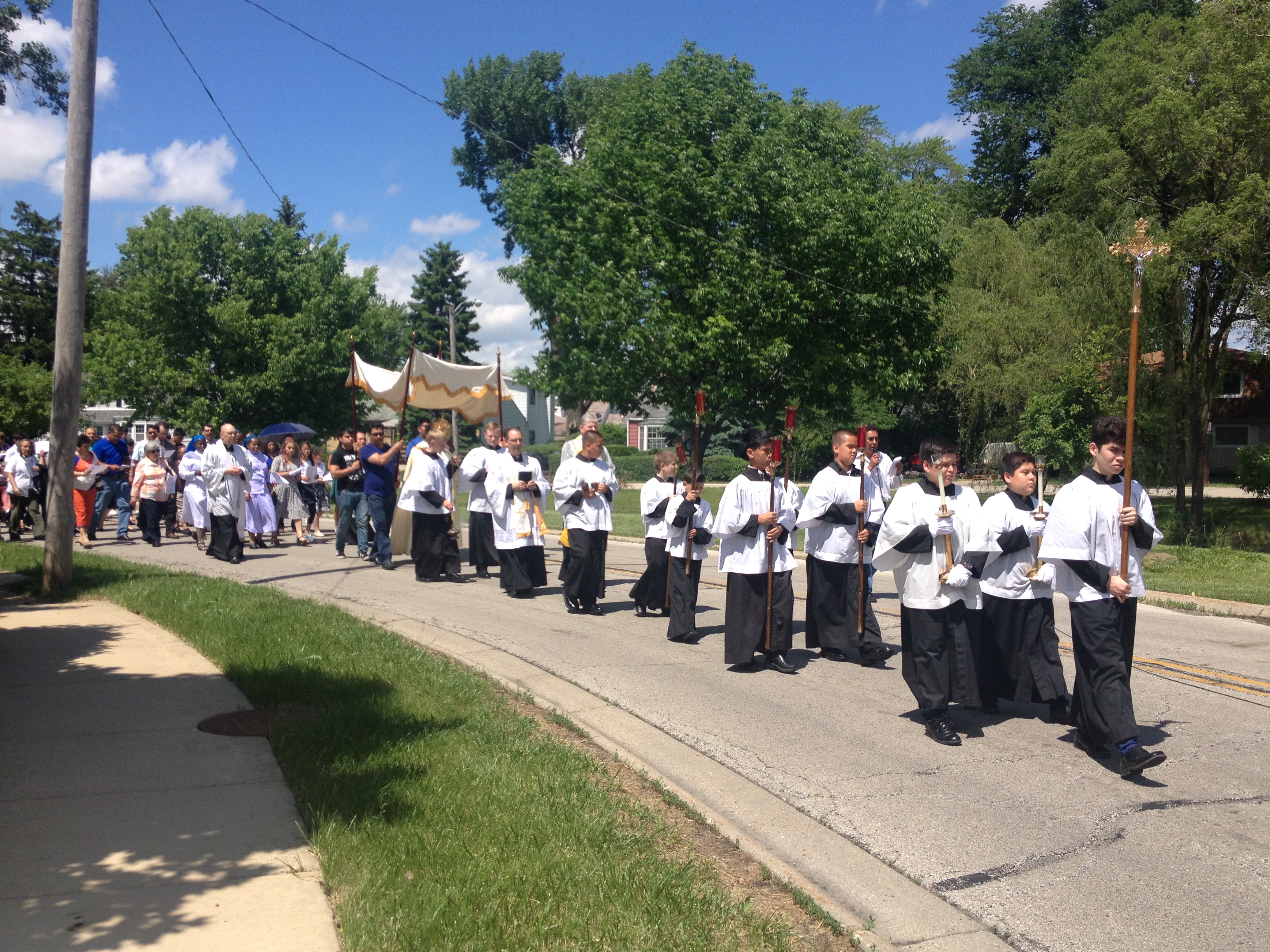
The Procession Ensues
.
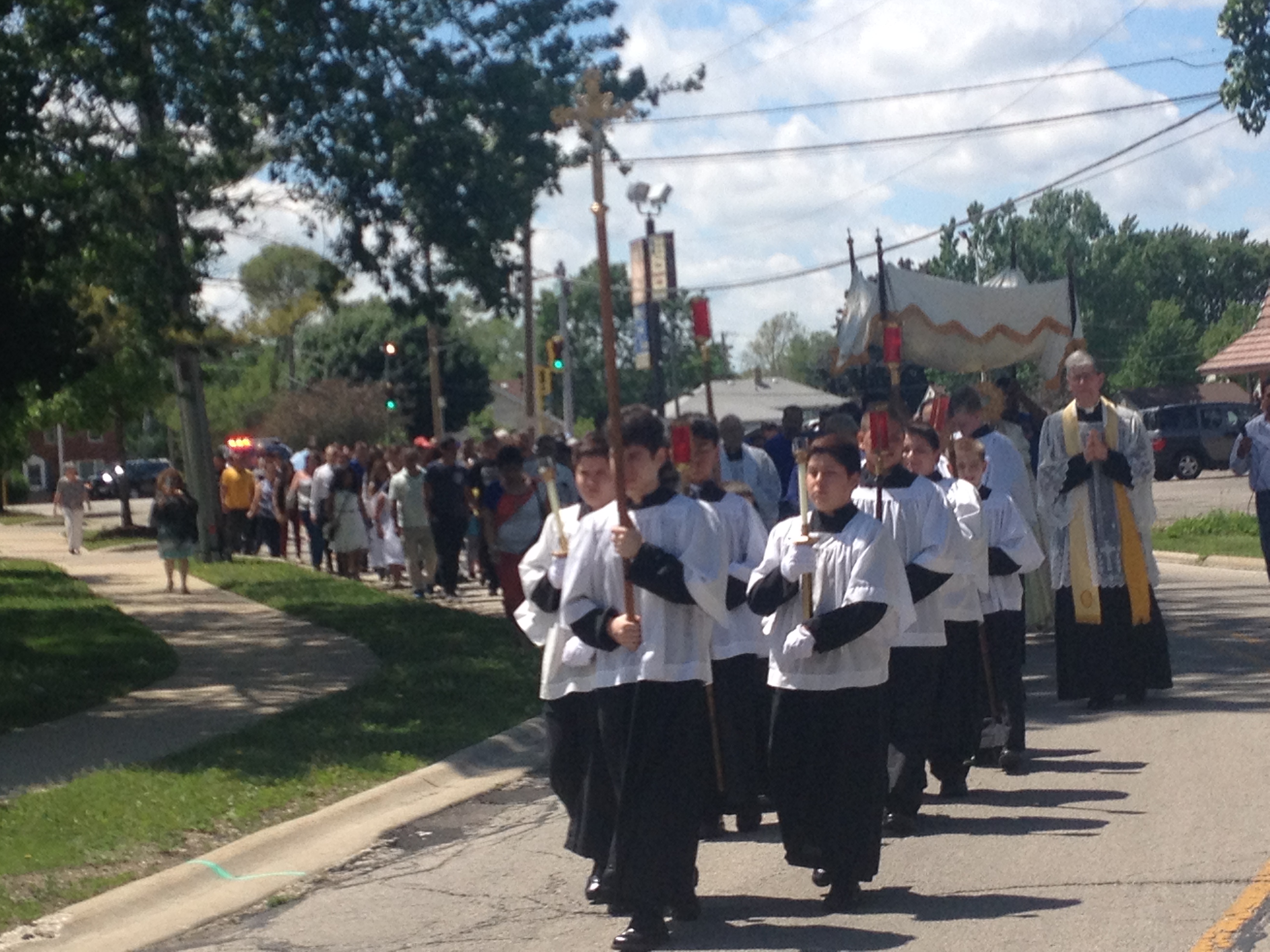
‘That they may see our Faith!’
.
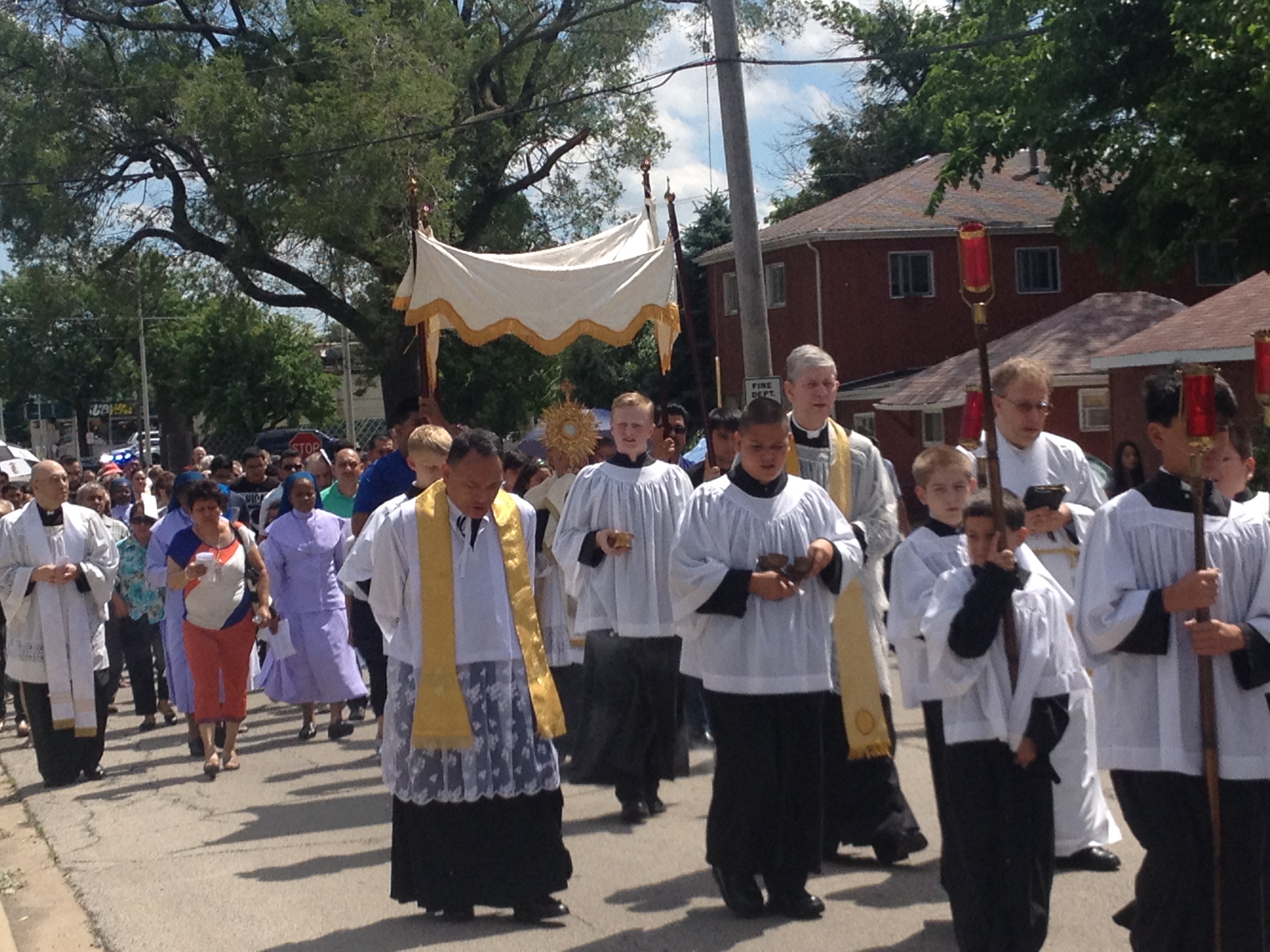
A beautiful day for God
.
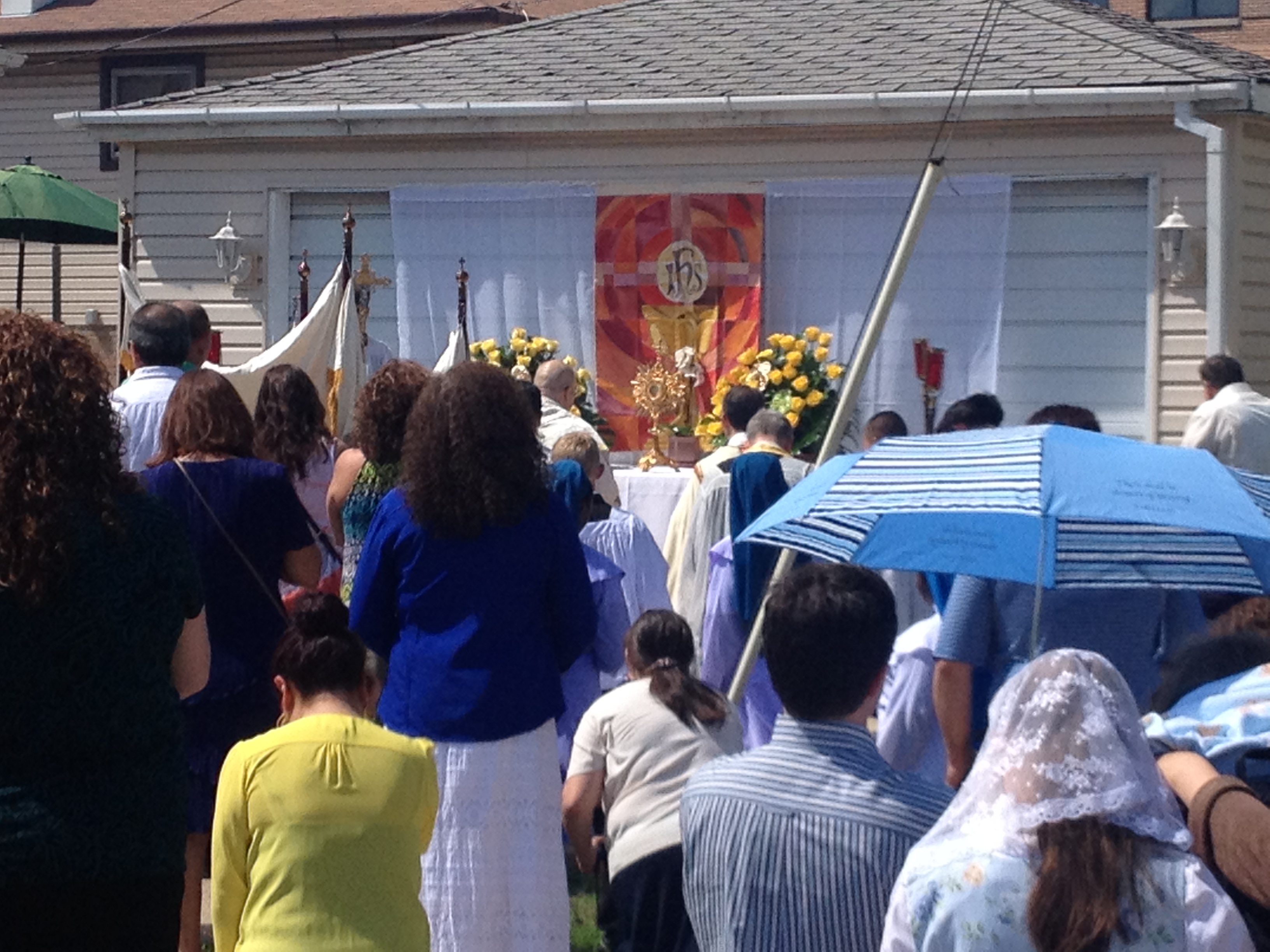
At the altars
.
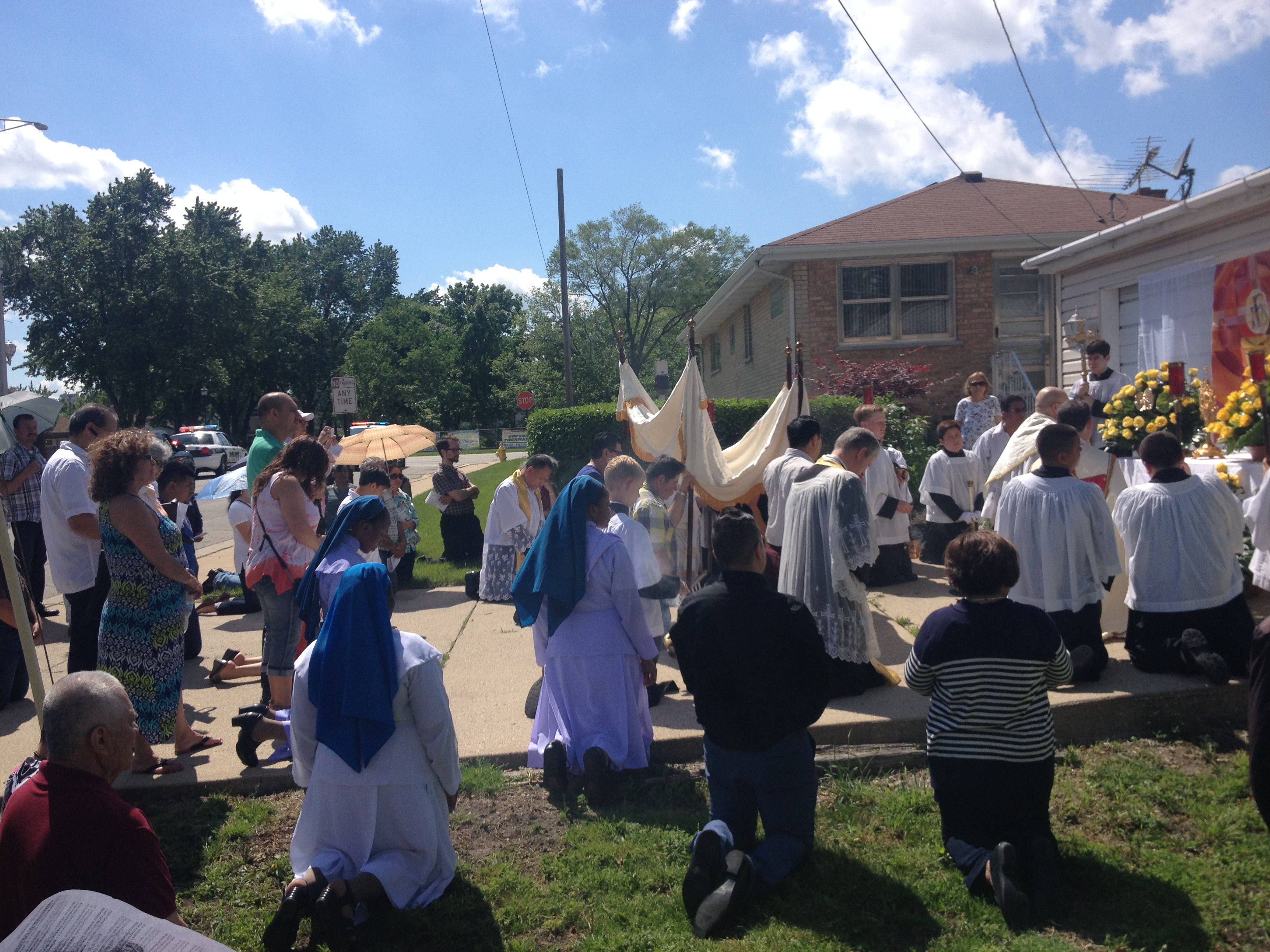
Come, let us adore Him
.
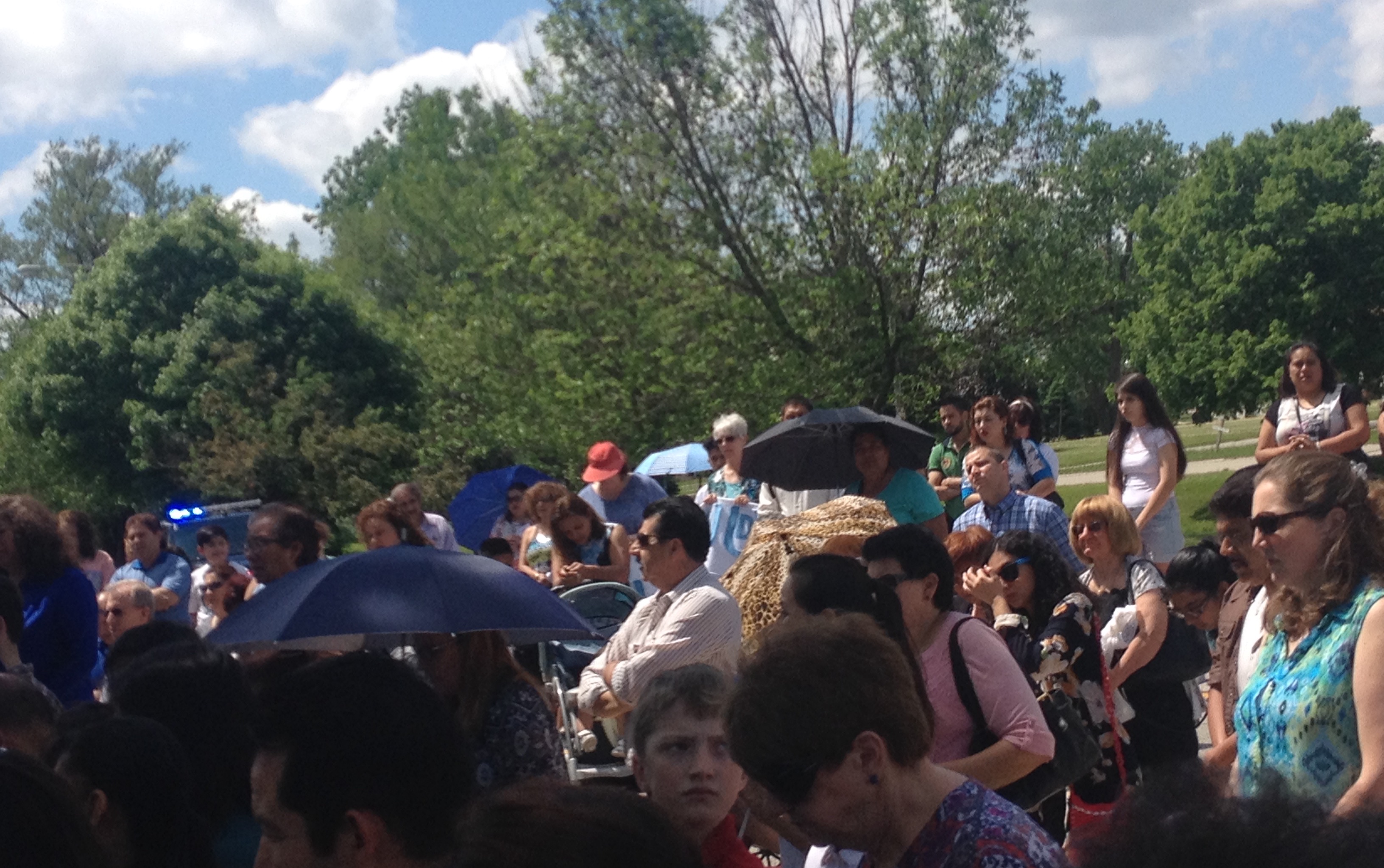
‘And a great crowd of people followed Him…’
.
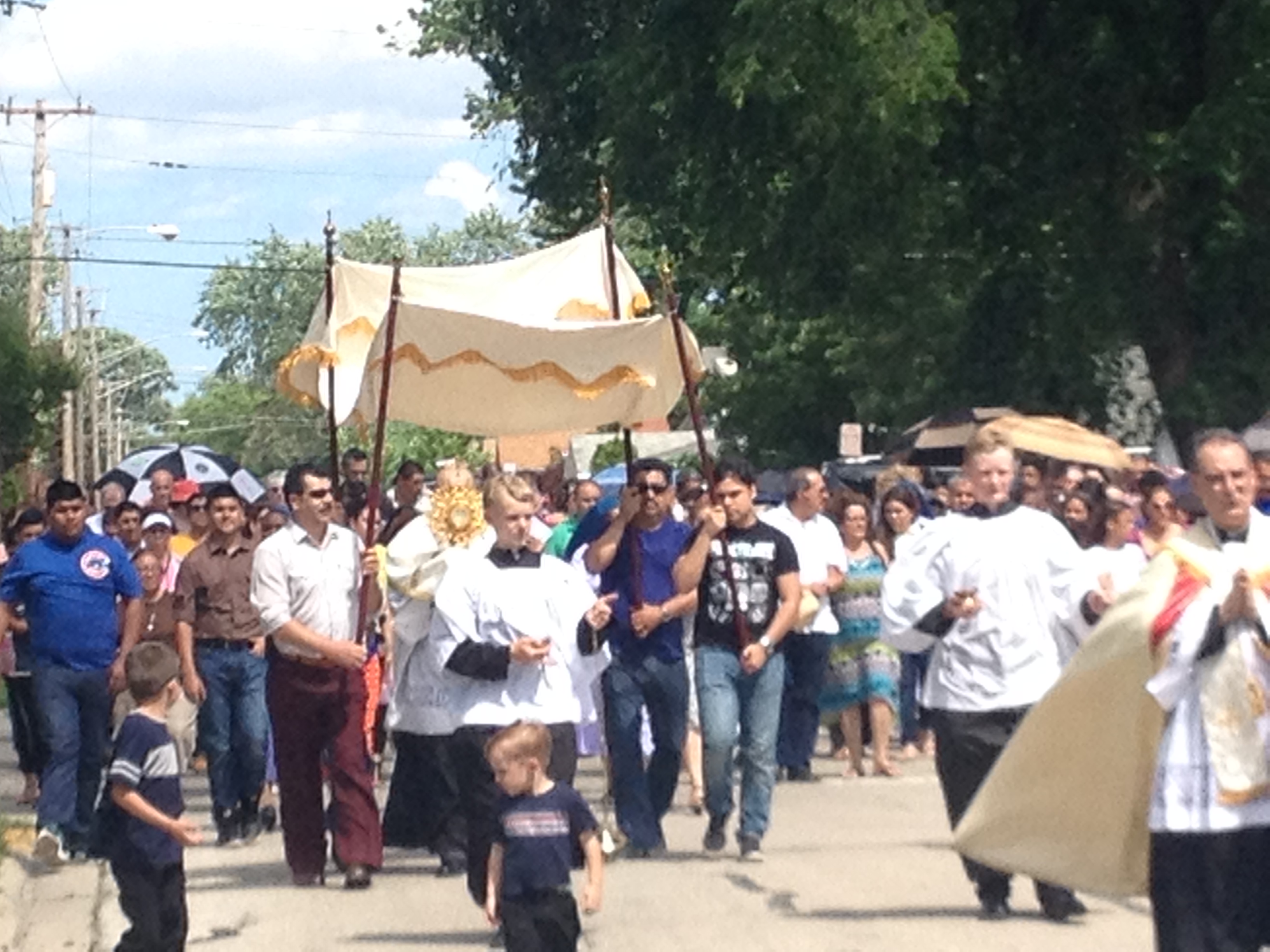
Let the children come to me…
.
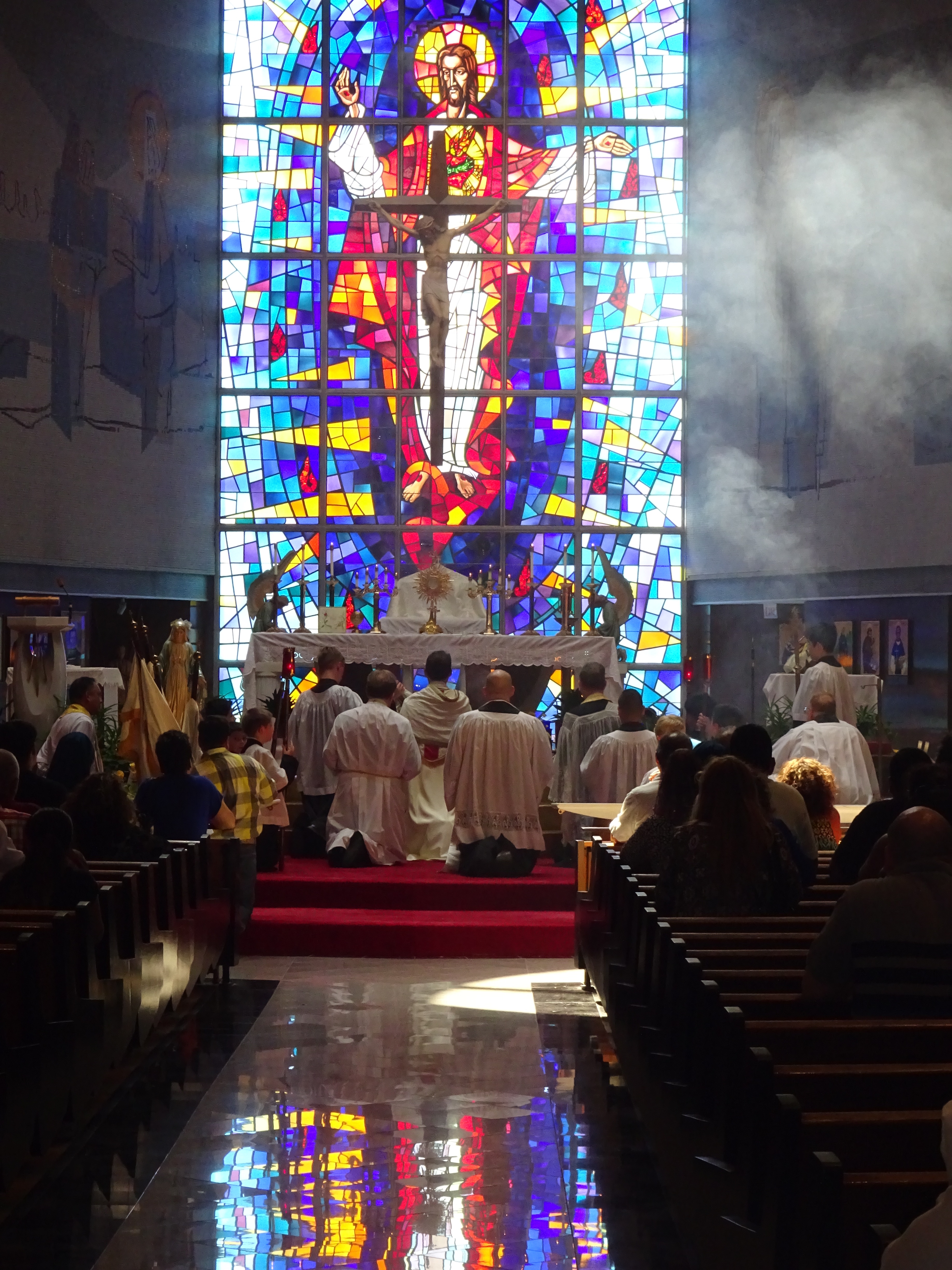
You have given them Bread from heaven
Corpus Christi
Beloved in the Lord Jesus, when we read through the Old Testament, we see there many unique events connected to a special bread. We see Melchesidech offering bread and wine in this mysterious sactifice; we see the Bread of the Presence in the temple, there with wine, changed by the priests every week. And the miraculous manna, that kept the people alive daily in the desert journey. These and many other references, all pointing forward to something new that the Lord would give us. Jesus himself says that he is the New Manna, the true Bread from heaven, and that in this form, he will give us his Flesh to eat.
.
One evening I was at a gathering with the Knights of Columbus, and there was a priest visiting, Fr. Thomas McCarthy. When I saw him, although I had never met him before, I immediately asked him: ‘Father, tell us about it. What was it like?!!’ Though he was very old, he smiled, because he knew what was on my mind.
.
In 1996, Father McCarthy was visiting a chapel in Worcester Massachusetts. He was offering Mass with a small group of people, and two other priests. But that day was different. As he prayed those sacred words of Consecration over the Host: ‘This is my Body,…’ a pool of blood appeared on the Host. He looked down to see the bleeding, wounded Host on the altar, and saw there, the reality of the crucified Lord Jesus, made visible. The other priests at the altar saw it; he showed it to the people, and as a hush of excitement swept through the chapel, he motioned to them for quiet; and they continued the Mass. I knew of this, because by coincidence, that mass was being filmed!
.
Today is the Feast of Corpus Christi, in which we especially honor the Body and Blood of Jesus in the Holy Eucharist. So today we speak of this great miracle of the Mass, when, under the appearance of bread and wine, the True Body, and Blood, Soul, and Divinity of Jesus Christ appears on earth, and the bread and the wine are no more – only appearances remain.
.
2000 years ago, the little body of Jesus was born to Mary. And Mary went and offered this Divine Child in the Temple to God. For those who did not know or have faith, that child seemed a mere human baby. But for Mary and Joseph and those of Faith, even before seeing all of the miracles Christ would do, they believed that that Child was truly God, who had taken on humanity, who had clothed himself in our human nature.
.
Today is no different. This same Jesus is born into the womb of Holy Mother the Church, not by the word of the angel, but by the words of the priest. Not in the appearance of a child, but in the appearance of bread and wine. And then this Divine Child, is offered by Holy Mother church, in the Temple of God, which is heaven. Only persons of Faith know this and accept this. To be a Catholic, is to believe that this is indeed the miraculous truth.
.
When we receive Holy Communion, we are really renewing our Covenant with the Lord. It’s like in marriage. Vows are made at the altar, and then each time the spouses give themselves to each other in marital love, they are renewing their vows, their covenant. Holy Communion is called a ‘Wedding Banquet,’ because here we are joined in a union with our Beloved, a one-flesh union with Our Lord. And so we say, I give myself to you, I swear my love to you, my faithfulness.
.
If there is a small rift between spouses, a tiff, they still give themselves to each other. But if there is a wound to their relationship, a bad argument, they do not give themselves to each other, not without a reconcilation.
.
Same with Jesus in Holy Communion. If we are not ready to receive the Lord in Holy Communion, if we have not been faithful to him in the way we live, then we don’t receive him until we have been reconciled in Confession. But if we are ready, at a given Mass, to approach the Holy Table, and receive into our soul, the dear Christ, to love him, and cherish him, all the days of our life, then let us receive Him with great reverence. ‘Lord, I love you, I praise you, I adore you!
.
Years ago there was a movie called STARGATE, and I think a tv show, I never followed it, but there was an idea there, that was interesting: a person could go through this Stargate, and come out in a vastly different place, another world, billions of light years away. Well, Jesus is like the Stargate. He’s come to prepare us to enter into a different world. Christ is the gate to heaven. He brings the power of God to us, in little doses each Sunday, preparing us, so that we can survive the journey through the Stargate to a new world.
.
It is only the glorified Body of Jesus which can make us ready for the new dimension of heaven, into a transcendently higher order of existence. The first Christians used to say that the Holy Eucharist is the Medicine of Immortality. Of course, if we receive Communion in mortal sin, it is not a medicine, but a terrible poison. Then it becomes the kiss of Judas. St. Paul speaks of this when he says that those who receive in an unworthy manner bring condemnation upon themselves. ‘This is why, he says, many of you have become ill and died.’[ii] – because of sinful Communions.
.
But by receiving the Lord worthily, Communion becomes a medicine, that in effect, is preparing us for a new type of world. The world ahead is called the New Creation. It is resurrected life. At Holy Mass, we partake, a little bit, in something that has come over to us from the New Creation. Little by little, we are being prepared to live in the New World.
.
May the Blessed Virgin help us, that we will swear our life to Christ, and always receive him with purity and love and faith.
.
[Entrusted to the prayers of St. Therese]
.
[i] 1 Cor 11:27-30
Friends in Christ, today’s first reading is from the 1st letter of St. Peter.
St. Peter says ‘let yourselves be built into a spiritual house, to be a holy priesthood.’ Here, when he says ‘priesthood,’ he is speaking not to ordained priests, but to all Christians. Referring to this very passage, the Catechism says that Christians, by virtue of their baptism, share in the Common priesthood of all believers. (CCC 1268) This is also called the Royal priesthood, or the Priesthood of the baptized.
.
The ordained priest, shares in the priesthood of Christ the Head of the Church. All the baptized share in the priesthood in the Body of Christ. As St Peter says, we are a kingdom of priests; we are called a ‘priestly people.
.
So what is a priest? Quite simply, it is a person who offers sacrifice to God. Jesus is the great High Priest – he offered the greatest sacrifice to God, himself. But if we are a priestly people, what do we offer? We offer really two things: all that we do, and all that we are.
.
When we had difficulties, my mother used to say: ‘Offer it up.’ ‘Offer your trouble for the poor souls, offer that pain to God.’ This is our priestly dignity. This is what St. Peter means when he says that we are to offer ‘spiritual sacrifices.’
.
We offer up the difficulties we have, the patience that we must have, to endure certain situations; we offer our prayers to God, which call down his mercy on those for whom we pray. In this we are intercessors for others. We offer our sorrows but also our joys. When something goes well, people will say: ‘Praise God!’ Yes, praise God! We offer up our joys and successes and praise, we offer our very selves. So this is our priestly dignity, as members of the Body of Christ.
.
But none of our efforts, or our work, or anything, is a worthy offering to God unless they are united to the Perfect Sacrifice: Jesus Christ. And this is done at Mass. The Catechism, speaking of the Mass, says that the ordained priest at the altar, acting in the Person of Christ, unites the votive offerings of the faithful to the sacrifice of Christ. (CCC 1566)
.
At Mass, on that paten with the hosts, is not only bread which will become our Divine Lord, but quite literally we are on that paten as well with all of our acts of patience, sorrows, joys – our life. This is why the Church asks, that at least on Sunday, it is good if the faithful present the bread and wine: it is a sign of the presenting themselves too – as an offering.
.
It is not only the Lord’s crucified body that we offer to God, it is his entire Mystical Body, the Church, which is offered up at each Mass. Because we are a kingdom of priests.
Friends in Christ, today is the feast of St. Bede the Venerable. St. Bede was born in England in 672, and at age 7 his parents sent him to be educated at a Benedictine monastery. He never really left, and from early on, his love was for the Holy Scriptures; he was also an expert in Greek and Latin. His commentaries on Scripture are many, but he is also famous for ‘The Ecclesiastical History of the English People,’ a work that gained him the title “The Father of English History”. Little would be known of English history before 729 if it weren’t for Venerable Bede.
.
Although he is a Saint, he is still often called ‘Venerable Bede.’ He obtained this title in the following way: when he was quite old, and his eyesight was poor, he was sometimes led by a brother so that he could preach in the villages. Once, as they were passing through a valley that was filled with large stones, this brother as a joke, told him there were many people there waiting to hear him preach – but they were only stones. Not able to see clearly, Bede preached the Word. Reminiscent of Jesus’ words, the stones themselves cried out, saying, ‘Amen, Venerable Bede.’ Having heard of this marvel, the people called him the Venerable Bede.
.
As his death neared, he had not yet finished his translation of the Gospel of John. His assistant, a young brother told him: ‘There is still one sentence dear master which is not written down,’ and when the last passage had been supplied, and he was told that it was finished, Bede exclaimed, ‘you have well said, all is finished. He died as he was saying the Glory Be.
.
His life shows that one need not be showy or loud to be great. Although he rarely left his monastery, he became known throughout England and far beyond – he has been called ‘the happiest of monks.’










